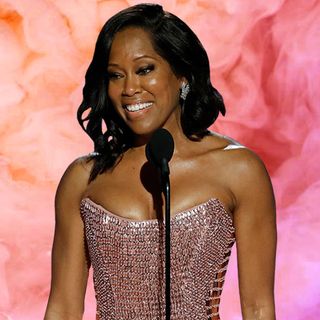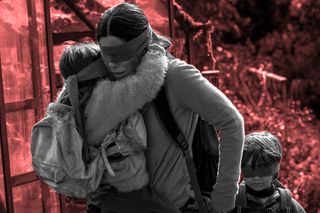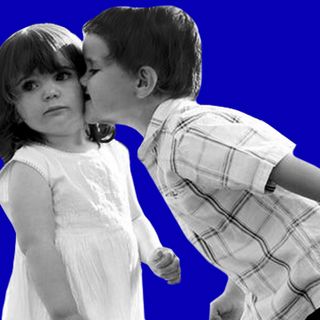
‘Bird Box’ Shows Us a Version of Motherhood We Rarely Get To See
The Netflix film takes the fear behind modern parenting to the extreme.

Netflix’s latest thriller, Bird Box, opens with a close-up of Sandra Bullock as she lays out the rules of the post-apocalyptic world to the viewers, and two 5-year-olds.
“You have to do every single thing I say, or we will not make it. Understand? Under no circumstances are you allowed to take off your blindfold. If I find that you have, I will hurt you. Do you understand? […] If you look, you will die.”
It becomes apparent, through the course of the film, that some kind of monsters or beings have wreaked havoc over the world, and merely looking at them is enough to drive people psychotic and make them commit suicide. Blindfolds come to serve as a way to leave the safety of darkened houses, in case one needs to get more supplies, or, in Bullock’s character Malorie’s case, flee to a safe haven. For along with the dark, demonic forces, there are also a few people — mostly ones who have had mental health problems — who are unaffected by the monsters, and roam the deserted cities and towns, trying to make people who have managed to survive ‘see.’ But as much as Bird Box is about these scary monsters and people who are either self-destructive or bent on harming others, the film’s central concern seems to be the idea of motherhood and what that might look like in the face of danger.
The film switches between Malorie and the two children, named ‘Boy’ and ‘Girl,’ beginning their arduous 48-hour journey down a river to a safe community whose existence is uncertain; and five years earlier, when Bullock is pregnant and the epidemic hits the U.S. What feels the same, though, is Malorie’s unwillingness to be a mother. The flashback brings us to her check-up when her obstetrician tells her, “Just because you can’t see something doesn’t mean it’s not there.” Finally accepting her pregnancy, Malorie is contemplating giving her child up for adoption when the end of the world puts a damper on her plans.
Exploding the traditional idea of nurturing motherhood was a very conscious decision for director, Susanne Bier, and it’s exactly what attracted her to Josh Malerman’s 2014 novel on which the film is based. “I think there is that sort of aggressive forcefulness [in motherhood] that hasn’t been shown [in movies] a lot,” she told Variety. When asked what the reason for this omission might be, she replied, “Well, partly because men had the platform to show what [motherhood] was, and supposedly that was not how they wanted to see it. Maybe it is a slightly scary image. Being forceful might not be as cute.”
As the monsters begin psychologically coercing people to commit mass suicide, including Malorie’s sister played by an under-utilized Sarah Paulson, a pregnant Malorie and a group of strangers seek refuge in a house together. These survivors, played by Trevante Rhodes, John Malkovich, BD Wong, and others, let in another pregnant woman, Olympia (Danielle Macdonald), to their safe house. Olympia and Malorie are held in apparent contrast with each other — one represents motherhood as softness and safety, while the other defines her parenting through fear and discipline. It doesn’t take a genius to figure out which one of these women will be surviving the apocalypse, with Olympia even apologizing for having been raised by caring parents and married to a loving man, thereby making her unable to face the struggles of this scary new world. When Olympia doesn’t make it, the reluctant new mother adopts the child as her own as well. As Malorie’s children grow up, she trains them to keep their eyes closed and use their other senses, preparing them for the worst. Their childhood is not one filled with fairy tales or motherly affection, and Malorie is particularly harsh with them.
Malorie and the children’s perilous journey along the river, rowing while blindfolded for days and fending off dangers that ranged from murderous men to the rapids in the river itself, might be seen as an allegory for motherhood and navigating potential disasters. Her training and threats clearly serve their purpose, keeping the children safe until the end of the film where, finally, their effectiveness is questioned.
In a pivotal scene, the monsters surround the two children and are whispering that they should take off their blindfolds. Malorie can’t see them, let alone save them. While her entire relationship with them has been driven by danger and survival, she now has to treat the children with love rather than fear in order to gain their trust and get them to follow her voice back to her. It’s a paradigmatic shift in her thinking, from simply viewing them as fellow survivors who she must keep safe, to her own children. “She realizes that by being as adamantly tough with [the children] she is ignoring something that they need, which is [the permission] to dream – she has closed up any dreams, and she has done this to herself as well. That was a mistake and she is kind of saying sorry for that,” says Bier.
Arguably, the scariest thing about Bird Box is not the monsters, but this idea of motherhood that feels less alien than it should. In a world of increasing economic anxiety, intensive parenting has become pretty commonplace. Culling data and experts’ opinions on the matter, the New York Times published a piece on ‘the relentlessness of modern parenting,’ that speaks to this idea of childhood now being constantly monitored and assessed. Modern parenting, it seems, is driven by the fear of outside forces negatively affecting children’s futures. And the solution of just putting your head down, and being aggressive and focused until your goal of safety is achieved, feels an awful lot like Bullock blindfolded in a boat with two children.
The argument that Bier and Bird Box make, lays out both the advantages and disadvantages of this approach — if your parenting is driven by fear alone, sure — your kids might survive; but in order for them to truly live, parenthood must encompass a greater complexity.
Nadia Nooreyezdan is The Swaddle's culture editor. Since graduating from Columbia Journalism School, she spends her time thinking about aliens, cyborgs, and social justice sci-fi. She's also working on a memoir about her family's journey from Iran to India.
Related


Consent Isn’t Just a Value; It’s Also a Set of Skills
